|
|
|
Sort Order |
|
|
|
Items / Page
|
|
|
|
|
|
|
| Srl | Item |
| 1 |
ID:
077078
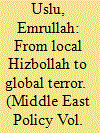

|
|
|
|
|
| Publication |
2007.
|
| Summary/Abstract |
On November 20 and 25, 2003, Istanbul was rocked by four suicide bombing attacks in which trucks heavily loaded with explosives killed over 60 people. The November bombers first attacked two Jewish synagogues; five days later, the British Consulate General and the Istanbul headquarters of the HSBC bank were the targets. These dramatic, deadly assaults were unexpected and without precedent. They revealed that radical Islamic terrorist groups in Turkey pose a new and serious threat. Their goals and targets have become global rather than local, and their doctrine now sanctions the indiscriminate killing of innocent civilians. In support of their new modus operandi, their members are undergoing a thorough process of radicalization and training. As all of this suggests, these new terrorists generally share the aims, values and ideological orientation of al-Qaeda but are not directly subordinated to the organization.
Indeed, the group that carried out the bombings was typical of the many largely independent local al-Qaeda "franchises" identified in the Middle East today. Credible reports indicate that group leaders received some general funding from al-Qaeda sources. However, they recruited their subordinates, selected their targets, performed their operational planning, and acquired their vehicles and explosives on their own. They assembled their group on the basis of past organizational affiliations, kinship, tribal ties (to a limited extent) and, primarily, close personal and hometown relationships. Of course, these factors often overlapped. For example, several of the terrorists both had common roots in the radical Kurdish Hizbollah organization (see below) and were natives of the southeastern town of Bingol,1 traditionally a major center of radical right-wing Islamism in Turkey
|
|
|
|
|
|
|
|
|
|
|
|
|
|
|
|
| 2 |
ID:
076099
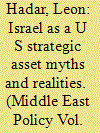

|
|
|
| 3 |
ID:
128818
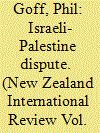

|
|
|
| 4 |
ID:
075258


|
|
|
|
|
| Publication |
2006.
|
| Summary/Abstract |
War in Lebanon highlights the lack of options, and victors, in the Middle East.
|
|
|
|
|
|
|
|
|
|
|
|
|
|
|
|
| 5 |
ID:
120438
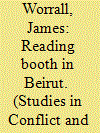

|
|
|
|
|
| Publication |
2013.
|
| Summary/Abstract |
The concept of Emancipation has become increasingly important in security studies in recent years but how well does the idea travel outside of the Western context in which it was conceived and into the Middle East? This article examines Hizbollah's four main identities: religious, resistance, socioeconomic, and as allies/proxies of Iran and asks to what extent this key regional non-state actor sees itself as an emancipatory agent in its own terms and how this differs from the Emancipatory ideal of Critical Security Studies (CSS). Does Hizbollah's current makeup offer enough scope to pursue Emancipation in line with the CSS project? Since the precept of Jihad offers Muslims a theological justification to engage in a holy struggle for a moral, spiritual, or political goal, seemingly Hizbollah is uniquely positioned to offer the prospect of Emancipation for the traditionally downtrodden Shi'a citizens of Lebanon, but does their Islamic faith and their aim of adherence to the Islamic way of life which they interpret from the Qur'an and Sunnah proscribe their credentials as truly Emancipatory actors? The article uses this analysis to examine the extent to which the commitment to universal Emancipation, found in CSS, is reconcilable with its Western-orientated foundation when applied in a Middle Eastern context.
|
|
|
|
|
|
|
|
|
|
|
|
|
|
|
|
| 6 |
ID:
108747
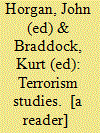

|
|
|
|
|
| Publication |
Oxon, Routledge, 2012.
|
| Description |
xxiii, 504p.
|
| Standard Number |
9780415455053
|
|
|
|
|
|
|
|
|
|
|
|
Copies: C:1/I:0,R:0,Q:0
Circulation
| Accession# | Call# | Current Location | Status | Policy | Location |
| 056355 | 363.325/HOR 056355 | Main | On Shelf | General | |
|
|
|
|
| 7 |
ID:
152869
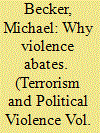

|
|
|
|
|
| Summary/Abstract |
Previous scholarship on variations in violence within a given terrorist organization has primarily focused on factors that lead to the inception or destruction of that organization. However, violence varies substantially even during the “prime” of an organization's life. This article aims to understand why violence varies in the short term within many organizations, and places a special focus on declines in violence. Specifically, I argue that terrorists face countervailing incentives in terms of how much violence to use, and that when declines in violent activity do occur, they can be divided into two types: a) elective declines, which are usually temporary and used for organizational or reputational recovery; and b) imposed declines, which are dictated by changes in the relative capability of an organization, and are more likely to be permanent. The causal pathways to each type of decline are discussed, and a plausibility probe, consisting of case studies of three terrorist organizations, is then developed to substantiate this theory. The findings have notable implications for counterterrorism policy, as they illustrate not only when and why terrorists choose to curtail violent attacks, but also the conditions that determine whether declines in violence are temporary or permanent.
|
|
|
|
|
|
|
|
|
|
|
|
|
|
|
|
|
|
|
|
|